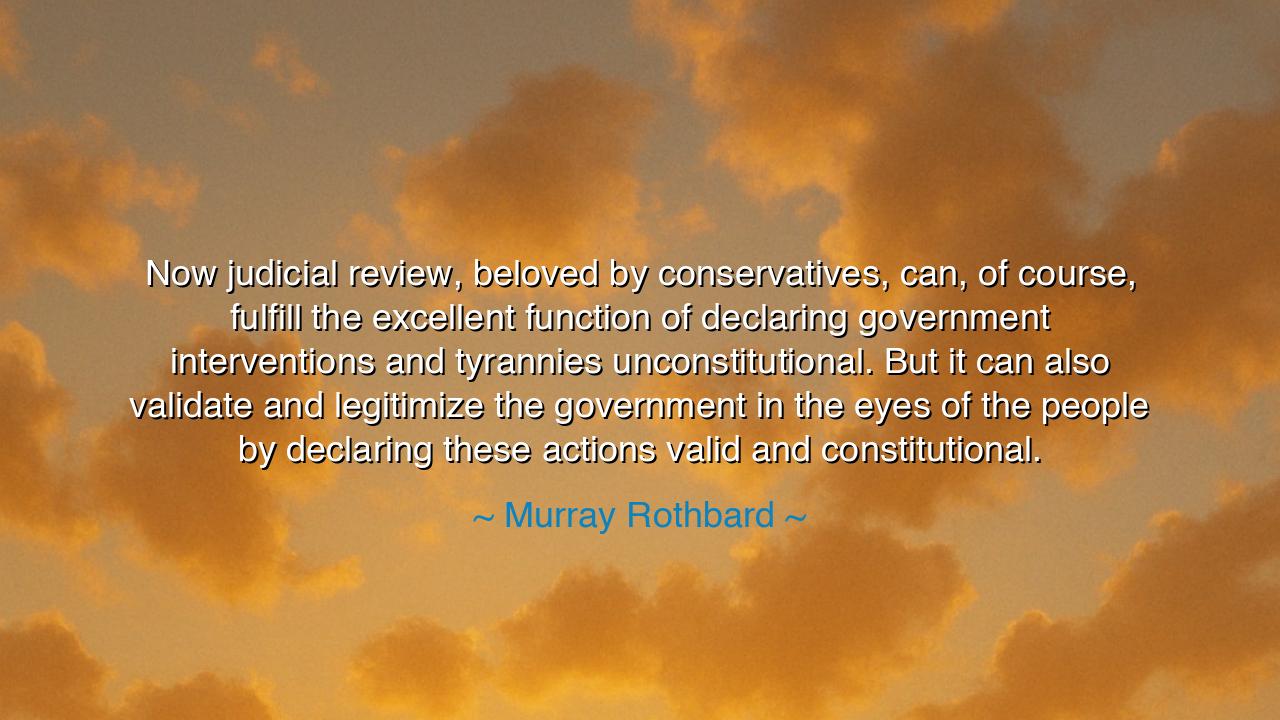
Now judicial review, beloved by conservatives, can, of course
Now judicial review, beloved by conservatives, can, of course, fulfill the excellent function of declaring government interventions and tyrannies unconstitutional. But it can also validate and legitimize the government in the eyes of the people by declaring these actions valid and constitutional.






Hearken, O lovers of liberty and seekers of wisdom, to the words of Murray Rothbard, the fiery economist and philosopher of freedom, who proclaimed: “Now judicial review, beloved by conservatives, can, of course, fulfill the excellent function of declaring government interventions and tyrannies unconstitutional. But it can also validate and legitimize the government in the eyes of the people by declaring these actions valid and constitutional.” Within this utterance lies a profound meditation upon the dual nature of power and law—how the same instrument that restrains tyranny may also sanctify it. Rothbard, ever wary of authority cloaked in righteousness, unveils the paradox at the heart of governance: that institutions built to protect freedom can, if unchecked, become its most persuasive betrayers.
In his time, Rothbard stood as a champion of libertarian thought, a philosopher who mistrusted centralized power in all its forms—whether monarchic, bureaucratic, or judicial. He spoke these words in reflection upon the doctrine of judicial review, that sacred mechanism by which courts may strike down laws that violate the Constitution. To the uncritical mind, such power seems the guardian of liberty; yet Rothbard, with the eye of history, saw its hidden danger. For if a court declares unjust laws to be “constitutional,” then oppression itself gains the aura of legitimacy, and the people, lulled by authority, surrender their vigilance. Thus, he warns that the gravest peril to freedom does not always come from open tyranny, but from tyranny sanctified by law.
Consider the tale of Dred Scott, whose name is etched in the annals of justice and shame. In 1857, the Supreme Court of the United States declared that an enslaved man had no right to citizenship, and that slavery was protected by the Constitution. In that dreadful hour, judicial review did not defend liberty—it betrayed it. The decision clothed the monstrous institution of human bondage in the garments of legality, convincing many that oppression was ordained by the nation’s highest law. Here, Rothbard’s insight finds terrible confirmation: that a court’s ruling, though delivered in solemn tones, may do not justice but violence to the human spirit when it validates tyranny under the guise of order.
Yet Rothbard is no enemy of law itself; he is its purifier. He acknowledges that judicial review, at its best, is a mighty shield against despotism. When wielded with wisdom, it can strike down the overreach of rulers, restoring balance between the governed and those who govern. The danger lies not in the mechanism, but in the blind faith of the citizenry—when people mistake the decree of authority for the voice of truth. For truth, he teaches, dwells not in institutions but in the eternal principles of justice and reason that transcend them.
From the ashes of history rise other examples of this duality. The Nuremberg Trials after World War II remind us that legality and morality are not always one. The Nazis, too, had their laws, their courts, their “constitutional justifications” for horror. But the tribunal at Nuremberg affirmed that law divorced from justice is no law at all. Rothbard’s warning is thus not a rejection of legal order, but a call to remember that every system of governance must bow to moral truth, or risk becoming an engine of oppression cloaked in legality.
The lesson, therefore, is both grave and luminous: never let the judgment of institutions replace the discernment of conscience. Citizens must not mistake legality for righteousness, nor suppose that liberty can be delegated entirely to courts or constitutions. The watchful heart must remain ever alert, questioning, and courageous. For when the people cease to think critically, when they accept without scrutiny what authority declares to be “constitutional,” then freedom, once guarded by vigilance, perishes by complacency.
Practical wisdom flows from Rothbard’s teaching: study the law, but also study history; respect institutions, but question them when they stray from principle. Uphold the courts when they defend justice, but hold them accountable when they exalt power. And above all, let moral truth—not mere legality—be your compass in judging the acts of the state. For the preservation of liberty depends not upon the perfection of institutions, but upon the courage of the governed to remember that no government, however noble in form, is infallible in practice.
Thus, Rothbard’s words resound as both warning and awakening: that the same sword which guards freedom can, in careless hands, wound it. Let every generation, therefore, remain vigilant, measuring the decrees of the powerful not by their authority, but by their justice. Only then shall liberty endure—not as a gift of the state, but as the birthright of every free and thinking soul.






AAdministratorAdministrator
Welcome, honored guests. Please leave a comment, we will respond soon